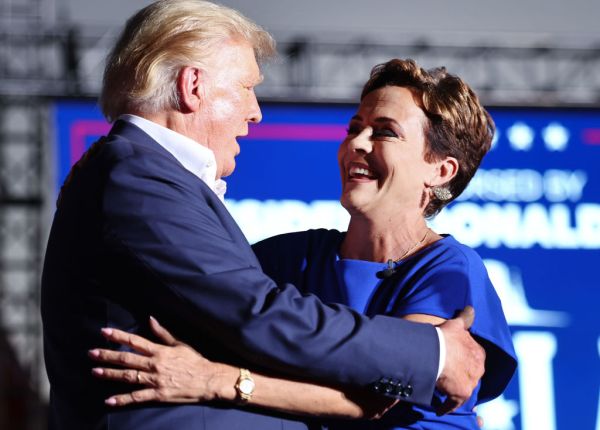A recurring problem in writing about mainstream populism is distinguishing the cranks from the con artists. How do you tell who’s in it for the grift and who’s in it because they have brain worms?
When I say “mainstream populism,” I mean the sort practiced by the average Republican influencer. We can safely ignore marginal strains like integralism and national conservatism, currently competing for intellectual pride of place among the proto-fascist wing of the GOP. And we can lay aside “reformicons,” who think the right focuses too much on culture war and too little on redistributing wealth to working families. That makes them an awkward fit both for mainstream populists and for the leadership of the new “working-class” Republican Party.
In mainstream populism, the line between cranks and cons can be blurry. For instance, a conspiracy theorist who finds himself welcomed into populist infotainment might develop a taste for the publicity and moneymaking opportunities that result. A grifter who flirts with conspiracy theories to expand his reach in populist infotainment might end up convincing himself that those theories are true in order to resolve the cognitive dissonance he experiences.
Trump is a case study. His Birtherism PR tour in 2011 was a blatant con aimed at boosting his TV time and building his profile among Obama-hating conservatives, and it did the trick. But his “rigged election” mania is murkier. It always struck me as a face-saving con gone wrong, a storyline he cooked up to spin his defeat but that he came to believe as deranged advisers like Rudy Giuliani and Sidney Powell began whispering in his ear. For Trump, it wasn’t enough for Republican voters to doubt that he’d lost fairly. His pathological narcissism required him to doubt it too.
I’m thinking about all of this after reading Matt Lewis’ column today in The Daily Beast reflecting on the sad spectacle of Kari Lake. Two months ago, Lake was poised to become governor of Arizona, a shortlister for the 2024 Republican ticket, and the second-most charismatic figure in right-wing populism. As it is, she’s unemployed and relegated to making obscene gestures for the amusement of Charlie Kirk fans.
Recently she’s also made several pilgrimages to the Mecca of American election denialism to affirm her faith that her loss to Democrat Katie Hobbs in Arizona was, naturally, fraudulent.
“Doubling down on election denial after Republicans choked in the 2022 midterms (as a result of Trump’s reverse Midas touch and ‘candidate quality’ issues) is sort of like deciding to invest big in FTX cryptocurrency… today,” Lewis writes. Lake has charm, poise, and sky-high name recognition, and Arizona just so happens to have a wide-open Senate race looming in two years. Why would she go all-in on challenging an election defeat, having just seen firsthand how that alienates voters, instead of conceding her race and preparing a comeback by hammering the left on more favorable cultural terrain?
It makes no sense. She barely lost last month; even a slightly less conspiratorial version of Kari Lake might properly be considered the favorite in the battle for Kyrsten Sinema’s Senate seat. Instead she’s doubling down on fruitcake populism.
Is she a grifter or a crank?
We pundits prefer to believe that political figures behave rationally, and not just because it helps us sleep at night to think that the country is in the hands of not-fully-insane people. If politicians’ behavior can’t be understood as strategically self-interested then punditry is pointless. What’s the use of trying to write something thoughtful about Kari Lake if the takeaway is destined to be nothing grander than “She’s nuttier than a Planters factory”? Unhinged candidates don’t require political analysis, they require a psychologist.
It’s rare (I think?), but sometimes politicians really are nuttier than a Planters factory. In Lake’s case, there’s reason to suspect that her obsession with election fraud is less a carefully constructed grift to woo MAGA voters than proof of a bona fide crankish strain in her thinking. If you’re so deep into the so-called Big Lie that even Donald Trump is moved to marvel at it, you’re in very deep.
Trump, aides say, has delighted in watching Lake’s rise, seeing echoes of his own. A former TV news anchor-turned-right-wing gubernatorial candidate in Arizona, she, like him, has delighted in sparring with the media and made repeated falsehoods about the 2020 election the centerpiece of her campaign. Her monomaniacal focus on that topic, in fact, has made even Trump himself blush.
“It doesn’t matter what you ask Kari Lake about – ‘How’s your family?’ And she’s like, ‘The family’s fine but they’re never going to be great until we have free and fair elections,’” the former president has frequently recounted to donors, according to a source close to Trump’s political operation. “He was like, ‘You could ask her, how’s the weather?’ And she’ll turn it into the election. ‘Oh, the weather in Phoenix is OK, but you can never have great weather unless the election is fair.’”
It’s comforting to think that Lake’s election denialism is a bit, but if so, it’s a bit to which she’s so committed that she seems not to be breaking character even in private.
The Occam’s razor answer to Lewis’ question, then, is that Lake is sinking deeper into election denialism because that’s who she is. We’re constantly comparing Trump’s hardcore base to a cult, aren’t we? Well, go figure that a recent convert like Kari Lake might succumb to zealotry, particularly with respect to something like elections. Whatever it was about Trump and Trumpism that transformed an Obama voter who was chummy with drag queens into a fire-breathing MAGA warrior may have similarly transformed her view of American democracy.
Here’s a theory. It’s a core conviction of right-wing populists that they alone represent The People, so when The People in Arizona choose a lackluster nebbish like Katie Hobbs over a dynamo like Lake, it simply does not compute for MAGA true believers. There must be a more sinister explanation.
Hence the cheering from Lake and her acolytes over Monday’s ruling that only two of her 10 election fraud claims will be granted a trial. The bar for proving those claims is extraordinarily high: Lake will need to show that officials intentionally sabotaged printers to disrupt voting in Maricopa County on Election Day or that the chain of custody of completed ballots was broken, allowing corrupt officials to add an unknown number of votes. The likelihood of Lake being able to prove a deliberate conspiracy is a hair north of zero, but if you believe that The People could have voted only one way in this election then you’re necessarily credulous about her chances of victory in court.
She’s a conspiracy theorist. She’s going to fall for conspiracies, particularly ones that explain away her own failings. The solution to Lewis’ mystery may be no more complicated than that.
But if you insist on some rational political strategy to explain Lake’s behavior, you can cobble one together with a bit of effort. Her political “brand” may be so damaged by her embrace of Trump and election denialism over 2020 that she might have concluded it would hurt more than it would help at this point for her to tack to the center ahead of 2024. For every centrist vote she’d pick up by doing so, she might shed the support of two true-blue MAGA populists who’d resent her for cynically abandoning the Big Lie after it cost her an election.
Remember, in Arizona the state Republican party is led by cranks and the populist electorate continues to nominate cranks. There’s no good reason to think she’d be her party’s nominee for Senate in two years if she ran to the center and was challenged by a hardcore conspiracy theorist like Mark Finchem in the primary. To believe that is to believe that Republican voters have been chastened by the outcome of this year’s midterms and will nominate “electable” candidates going forward. Perhaps they have, perhaps not. I’ll believe it when I see it.
It speaks volumes, though, that Ron DeSantis continues to trend anti-vax despite the fact that his biggest rival, Trump, is wedded to the pro-vax position. If DeSantis thought Republican voters were poised to turn centrist after November’s disappointment, he’d be scrambling to show off his pro-vax bona fides. Instead he’s doing the opposite, gambling that mainstream populism practiced by the primary electorate is and will remain conspiratorial garbage. If you don’t sate their appetite by feeding them the garbage they crave, some ambitious challenger who’s eager to get to your right will.
Lake might, in other words, view her recent defeat as a case of “if it ain’t broke, don’t fix it.” She barely fell short against Hobbs in the general election and impressively fended off a mainstream challenger backed by Doug Ducey in the primary. In 2024, with the presidential election driving higher turnout and Democrats divided between Sinema and a left-wing challenger, Lake might very well win by doing what she’s doing now.
If being a crank makes you the favorite in a primary and no worse than a 50/50 shot in the general election, isn’t it the rational play?
There’s another way in which Lake wading deeper into election denialism after her defeat is rational, though. The deeper she gets, the more of a star she becomes on the populist vaudeville circuit.
You know what I mean by the vaudeville circuit.

In the Before Times, major right-wing political events would be a cattle call of presidential hopefuls with a smattering of talk-radio hosts. CPAC was the star attraction. Each year they’d get someone like Rush Limbaugh or Ann Coulter to deliver the big address, which would inevitably mix conservative dogma with lib-owning laugh lines.
The modern vaudeville circuit fishes from a wider pond, commensurate with how right-wing media has expanded into new media platforms while drifting away from movement conservatism. At the average Turning Point USA gala you might bump into Trump, a motley crew of ambitious Republican politicians, Fox News hosts, YouTube “personalities,” Very Online edgelords, podcasters various and sundry, Kyle Rittenhouse, anti-vaxxers, and figures so niche that I don’t know how to describe them. Participants are all of the right, at least inasmuch as they’re staunchly anti-left, but these events aren’t political in any serious way. They’re populist entertainment featuring your favorite MAGA celebrities.
Does this look like a “political event” to you? Or does it look like a concert crossed with a wrestling intro?
Rittenhouse got a similar rock-star introduction at a TPUSA event after he was acquitted on homicide charges. Turning Point is the purest expression of populist vaudeville, I think, because it’s the most overt in treating its production as a show with identifiable culture-warrior “stars” who may or may not have anything interesting to say about politics. But the vaudeville circuit runs through all sorts of right-wing channels. CPAC is part of it; so is that weird Christian nationalist tent revival thing that Mike Flynn keeps showing up at; to a lesser extent, so is Mar-a-Lago.
If your otherwise respectable conservative organization looked around for someone to speak at its annual gala and settled on Marjorie Taylor Greene, you too may be part of the vaudeville circuit without realizing it.
The ingredients to becoming a star in populist vaudeville are charisma, of course, a compelling victim narrative, and Trump sycophancy. Kari Lake has all three in spades. She’s a skilled performer after many years on the air as a TV anchor, more comfortable in front of an audience than practically anyone else at these events. Her “stop the steal” shtick in Arizona lets her play a martyr to crowds who have been primed to believe that Democrats routinely cheat their favorite Republicans out of rightful victories. And her slobbering over Trump is so effusive that she recently compared him favorably to her own husband.
Is it really so irrational for Lake to sink into the warm bath of adulation she’s found on the vaudeville circuit, where crankery isn’t just tolerated but encouraged and her political star is still ascending? She must be wounded by having lost to Hobbs, however reluctant she may be to admit it. Trump was so wounded by his own defeat that he reportedly has a staffer follow him around on the golf course, reading positive news clips about him to improve his mood.
Choosing to spend her time grandstanding to throngs of cheering kooks rather than reposition as a centrist might jeopardize Lake’s chances at future office, as Lewis speculates. But it might not. Trump still stands a solid chance at winning the Republican nomination, whether or not we call him the favorite, and Lake is improving her chances of becoming his running mate by fighting her defeat in court and putting on shows for Turning Point. If she lands on the ticket and impresses a national audience during the next presidential campaign, she might become an early frontrunner for the 2028 nomination even if Trump loses again in 2024.
And if that ambition is too grandiose, the less grandiose possibilities aren’t bad either. Stacey Abrams spent years challenging the legitimacy of her defeat in a gubernatorial race and ended up winning her party’s nomination a second time unchallenged. Lake could be hoping to follow the same path, doing what she needs to do to keep herself in the public eye. Or maybe she’ll follow the natural trajectory of a populist star with news anchor experience and land a gig on Fox or Newsmax, pulling in big bucks. If you were Fox management, wouldn’t you rather have Kari Lake leading into Tucker than Jesse Watters?
To be clear, I don’t think she’s playing a “long game” here. She’s likely just following her instincts—cry fraud, play the victim in front of any audience that’ll have her, and be as obnoxiously combative as possible. Which, for an ambitious Republican, are good instincts to have in the Trump era.
She’s even going to end up fleecing a few rubes before her election challenge is finally extinguished, having learned from the master. A sane party would be grievously embarrassed by this …
… but as it is, Lake will make bank off it.
In my first newsletter for The Dispatch I wrote about populists dividing the right-wing universe into suckers and fighters. “Fighters” relentlessly and unapologetically battle the left, the deep state, Big Tech, the U.S. election system, the “elites”—whoever the populist enemy du jour happens to be. “Suckers” are accommodationists, milquetoast Republicans who don’t perceive the threat or can’t muster the courage to confront it. The key thing to understand about fighters, as Lake reminds us yet again, is that you don’t actually need to win your fight. It’s fine to lose elections to nobodies, as Lake did in Arizona; it’s fine to have some of your great culture-war “victories” walked back or tossed out in court, as Ron DeSantis has in Florida. It’s the performance that matters. It’s vaudeville all the way down.









Please note that we at The Dispatch hold ourselves, our work, and our commenters to a higher standard than other places on the internet. We welcome comments that foster genuine debate or discussion—including comments critical of us or our work—but responses that include ad hominem attacks on fellow Dispatch members or are intended to stoke fear and anger may be moderated.